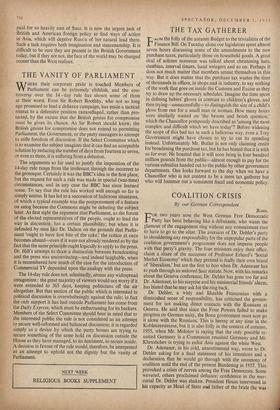THE VANITY OF PARLIAMENT
WHERE their corporate pride is touched Members of Parliament can be extremely childish, and the con- troversy over the 14 - day rule has shown some of them at their worst. Even Sir Robert Boothby, who not so long ago promised to lead a defiance campaign, has made a tactical retreat to a defensive position camouflaged, rather than pro- tected, by the excuse that the British genius for compromise must be given its chance. -As Sir Robert should know, the British genius for compromise does not extend to permitting Parliament, the Government, or the party managers to attempt to stifle freedom of discussion. If the Select Committee which is to examine the subject imagines that it can find an acceptable solution by reducing the number of days from fourteen to seven, or even to three, it is suffering from a delusion.
The arguments so far used to justify the imposition of the 14-day rule range from the irrelevant through the incorrect to the grotesque. Certainly it was the BBC's idea in the first place, but the request for such a rule was made in special (war-time) circumstances, and in any case the BBC has since learned sense. To say that the rule has worked well enough so far is simply untrue. It has led to a succession of ludicrous situations, of which a typical example was the postponement of a feature on smog because the Commons might be debating the subject later. At first sight the argument that Parliament, as the forum of the elected representatives of the people, ought to lead the way in discussion, has a certain plausibility; but when it is defended by men like Dr. Dalton on the grounds that Parlia- ment `ought to have first bite of the cake,' the notion at once becomes absurd—even if it were not already rendered so by the fact that the same principle ought logically to apply to the press. Dr. Hill's attempt to draw a distinction between broadcasting and the press was unconvincing—and indeed laughable, when it is remembered how much of the case for the introduction of Commercial TV depended upon the analogy with the press.
The 14-day rule does not, admittedly, arouse any widespread antagonism : the great majority of viewers would not worry if it were extended to 365 days, keeping politicians off the air altogether. But that section of the public which is interested in political discussion is overwhelmingly against the rule; in fact the only support it has had outside Parliament has come from the Daily Express, which must be embarrassing for its backers. Members of the Select Committee should bear in mind that to the interested public the rule is not considered as an attempt to secure well-informed and balanced discussion; it is regarded simply as a device by which the party bosses are trying to secure something of the same hold on discussion outside the House as they have managed, to its detriment, to secure inside. A decision in favour of the rule would, therefore, be interpreted as an attempt to uphold not the dignity but the vanity of Parliament.


































 Previous page
Previous page